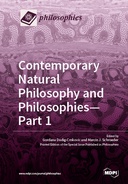Explore

Contemporary Natural Philosophy and Philosophies - Part 1
0 Ungluers have
Faved this Work
Login to Fave
Modern information communication technology eradicates barriers of geographic distances, making the world globally interdependent, but this spatial globalization has not eliminated cultural fragmentation. The Two Cultures of C.P. Snow (that of science–technology and that of humanities) are drifting apart even faster than before, and they themselves crumble into increasingly specialized domains. Disintegrated knowledge has become subservient to the competition in technological and economic race leading in the direction chosen not by the reason, intellect, and shared value-based judgement, but rather by the whims of autocratic leaders or fashion controlled by marketers for the purposes of political or economic dominance. If we want to restore the authority of our best available knowledge and democratic values in guiding humanity, first we have to reintegrate scattered domains of human knowledge and values and offer an evolving and diverse vision of common reality unified by sound methodology. This collection of articles responds to the call from the journal Philosophies to build a new, networked world of knowledge with domain specialists from different disciplines interacting and connecting with other knowledge-and-values-producing and knowledge-and-values-consuming communities in an inclusive, extended, contemporary natural–philosophic manner. In this process of synthesis, scientific and philosophical investigations enrich each other—with sciences informing philosophies about the best current knowledge of the world, both natural and human-made—while philosophies scrutinize the ontological, epistemological, and methodological foundations of sciences, providing scientists with questions and conceptual analyses. This is all directed at extending and deepening our existing comprehension of the world, including ourselves, both as humans and as societies, and humankind.
This book is included in DOAB.
Why read this book? Have your say.
You must be logged in to comment.
Rights Information
Are you the author or publisher of this work? If so, you can claim it as yours by registering as an Unglue.it rights holder.Downloads
This work has been downloaded 579 times via unglue.it ebook links.
- 62 - pdf (CC BY-NC-ND) at Unglue.it.
Keywords
- 1st-person and 3rd-person perspectives
- A.N. Whitehead
- Abduction
- acategoriality
- Active imagination
- aesthetics in science
- agent-based reasoning
- agonism
- analytical psychology
- anticipation
- Apophasis
- Aristotle
- Aristotle’s four causes
- autocatalysis
- Awareness
- big crunch
- big freeze
- Category theory
- causality
- centripetality
- Cognition
- Common good
- complexity
- compositional hierarchy
- computability
- Computation
- Consciousness
- contingency
- Contradiction
- Cosmology
- creativity
- Cybernetics
- dark energy
- depth psychology
- Development
- dialectics
- differentiation
- Digitization
- discourse
- discursive space
- dispositions
- dissipative structures
- dual aspects
- dual-aspect monism
- eco-cognitive model
- eco-cognitive openness
- embodiment
- emergence
- emergentist reductionism
- emptiness
- endogenous selection
- epistemic norms
- Epistemology
- errors of reasoning
- Ethics
- everyday lifeworld
- evidence and justification
- Evolutionary psychology
- exceptional experiences
- exoplanet
- F.W.J. Schelling
- fallacies
- final cause
- fitness
- Form
- heterogeneity
- holographic encoding
- humanistic management
- hylomorphism
- in the name of nature
- indeterminacy
- induction
- induction and concept formation
- induction and discovery of laws
- info-computational model
- information
- information-theory
- Intentionality
- internal quantum state
- internalism
- Ivor Leclerc
- Jungian psychology
- Knowledge
- L. Smolin
- Language
- Leibniz
- logic
- Mathematics
- Matter
- Measurement
- Memory
- memory evolutive system
- mental representation
- Metaphysics
- mind
- mind-matter relations
- monad
- n/a
- natural philosophy
- Naturalism
- Naturalization
- naturalization of logic
- Naturphilosophie
- neurodynamics
- Ontology
- Perception
- pessimistic induction
- Phenomenological psychology
- philosophical foundations
- philosophy as a way of life
- philosophy of information
- Philosophy of nature
- philosophy of science
- physicalism
- Physics
- problem of induction
- Process
- qualia
- qualitative ontology
- quantum computing
- quantum information
- R.M. Unger
- real computing
- Realism
- reflexive psychology
- Régulation
- relational biology
- retrocausality
- reverse mathematics
- Science
- scientific method
- scientific progress
- Second Law of thermodynamics
- second-person description
- Self
- signal transduction
- Space flight
- spatial representation
- state-space approach
- Subjective experience
- subsumptive hierarchy
- symmetry breaking
- Synthesis
- temporality
- the logic of nature
- thema EDItEUR::Q Philosophy and Religion::QD Philosophy
- theoretical biology
- theoretical unity
- theory of everything
- Thermodynamics
- third-way reasoning
- unitarity
- unity of knowledge
- Vacuum
- Void
Links
DOI: 10.3390/books978-3-03897-823-7Editions


